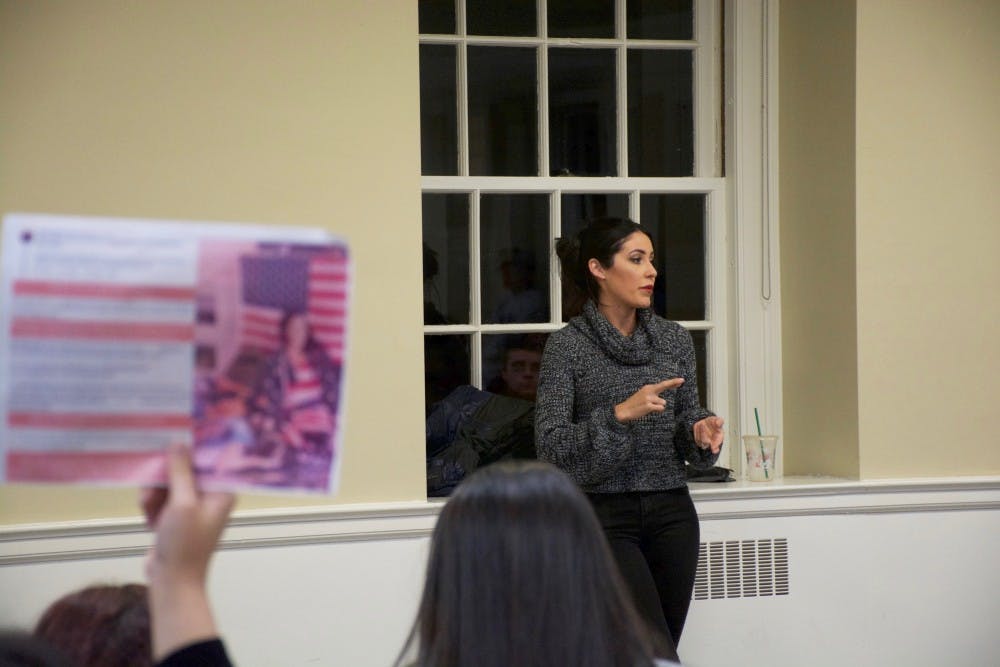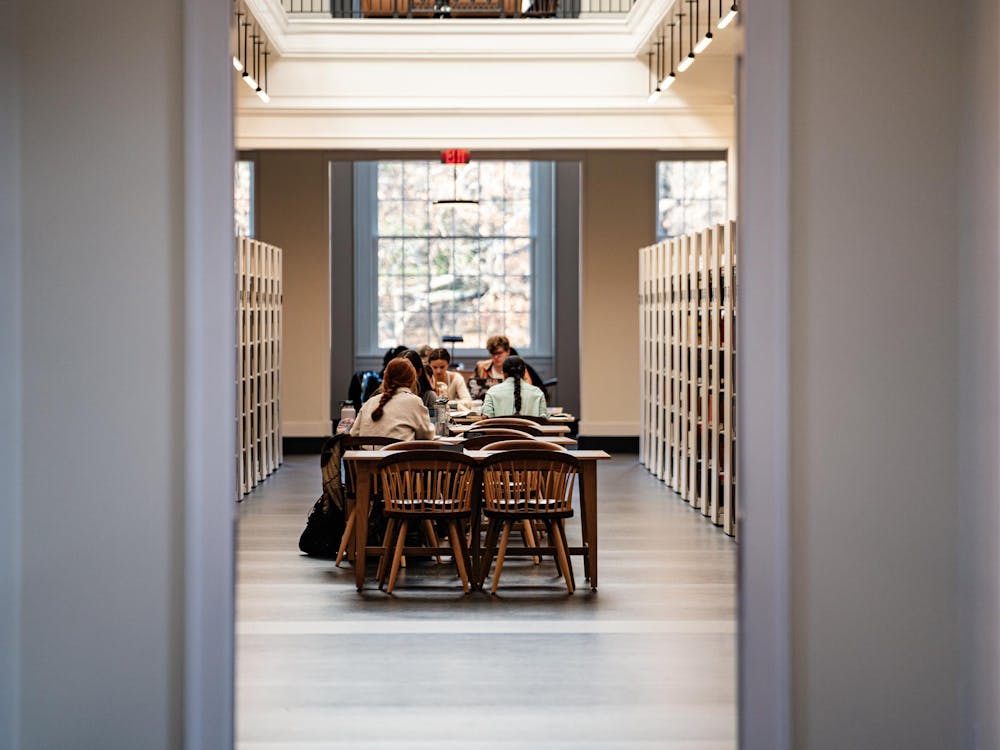Conservative commentator Anna Paulina addressed students at an event last week hosted by the University’s chapter of Turning Point USA — a student activist group for young conservatives on college campuses — where Paulina defended the right to bear arms by arguing women should be able to defend themselves against sexual assault and targeted attacks. The event included a discussion on Paulina’s background as a Mexican and Native American conservative and her views on immigration reform, which evoked concern from minority student leadership at the University and drew a protest of around 25 students.
Paulina — who serves as director of Spanish engagement for TPUSA — notably faced sharp criticism for past social media posts, in which she related undocumented immigrants to a rise in human trafficking, denied the notion that there are more than two genders and jokingly compared Immigration and Customs Enforcement trucks to ice cream trucks. She has also been criticized for comparing 2016 Democratic Presidential Nominee Hillary Clinton to herpes on a live Fox News segment.
In anticipation of Paulina’s lecture, held last Thursday, Central Americans for Empowerment at U.Va. issued a public statement drawing attention to what the organization described as “values that are antithetical to our community.” In an interview with The Cavalier Daily, Johanna Moncada Sosa, a third-year College student and chair of CAFE at U.Va., said the statement had two goals — to condemn aspects of Paulina’s rhetoric towards immigrants that were overlooked by TPUSA at U.Va., and to emphasize the significance of denouncing white supremacy.
“This is not the first time Turning Point USA at UVA has brought or attempted to bring a figure who embodies a threat to members within and outside of the UVA and greater Charlottesville community,” CAFE at U.Va. said in the statement. “Thus, Central Americans for Empowerment at UVA and the signatories below vehemently condemn Turning Point USA at UVA for hosting Anna Paulina as a Latinx spokesperson to engage with Latinx students at UVA without any form of consultation or notice that she will be here.”
The statement received 59 signatures from students and eight from student groups on Grounds — including DREAMers on Grounds, Latinx Student Alliance, Political Latinx United for Movement and Action in Society, U.Va. Students United, Living Wage Campaign at U.Va., U.Va. Young Democratic Socialists, Minority Rights Coalition and J Street at U.Va.
Alina Cartwright, a fourth-year College student and president of Turning Point USA at U.Va., said Paulina’s appearance and the large presence of protesters at the meeting was beneficial for everyone who attended.
“One of the tenets that Turning Point advocates for is freedom of speech and freedom of expression and that goes to both sides,” Cartwright told The Cavalier Daily. “We did experience some protesters or some students from the Latinx organizations who opposed her point of view. However, we engaged in a lot of civil discourse and we’re grateful that they were here because it was an opportunity for us to hear an opposing viewpoint.”
Paulina spoke in detail to the 40-person audience — more than half student protesters — about how a past home burglary incident convinced her to apply for a conceal carry permit. She argued in favor of guns as the ultimate deterrent to violent crimes and sexual abuse towards women.
“Why is it that we’re not empowering women to protect themselves?” Paulina said. “The #MeToo movement initially started with good intentions but I think the problem with that is that we’re not giving women avenues to protect themselves.”
In response to a student question about recent growth in the number of mass public shootings, Paulina noted killers continue targeting locations where guns are not allowed, citing a Crime Research report that says 97.8 percent of public mass shootings in the United States occur in gun-free zones.
“The only thing that’s going to stop a bad guy with a gun is a good guy with a gun,” Paulina said. She proposed that Congress pass the federal Concealed Carry Reciprocity Act — which would require all states to recognize concealed carry permits granted by other states, and allow permit holders to carry a concealed weapon in school zones in any state.
Paulina said disarming responsible and law-abiding gun owners would lead to a greater loss of lives, saying that America’s gun owners are not the problem.
“A spoon isn’t purposed to kill someone, but people kill themselves from being obese everyday — how about we put a ban on spoons?” Paulina asked. “A firearm is not going to kill someone unless I actively fire it. If I can’t tell you what to do with your body, you can’t tell me what to do with my gun.”
She also asked students why the government does not investigate the relationship between gun violence and addiction to opioids — certain pain pills, heroin and fentanyl — which produce side-effects such as aggression, self-harm, suicide and homicidal thoughts.
Sosa said CAFE at U.Va. — which was formed in October to give Central American students a voice and platform to increase awareness of Central American issues — wanted to be present at the event to protest Paulina’s past statements about immigrants and the growing migrant caravan crisis that has formed in Central America over the last two months, consisting mainly of Honduran men, women and families. Many face grave danger in their country and are petitioning for asylum in the U.S. or are fleeing poverty.
“It would have been impossible for us to not say something and to just sit there,” said Sarah Pape, a third-year College student and public relations chair for CAFE at U.Va. “We saw something that we deemed unacceptable and so we made a statement about it.”
In response to the initial statement from CAFE, Paulina told the audience that it was “ignorant.”
“That to me signified that you guys wanted to fight with me,” Paulina said. “It directly tore me down, it attacked my character, and you guys didn’t even hear the other side of the story.”
Prior to the discussion on gun rights being essential to women’s rights, Paulina addressed her stance on immigration by calling for a wall on the U.S.-Mexico border to prevent a rise in human trafficking, and blamed Democrats for not working with the Trump administration.
“I don’t think her presence necessarily made people uncomfortable, I think unwelcome or uneasy is the perfect way to put it,” Pape said. “She’s proudly Mexican-American … however, she doesn’t stand up for our community and doesn’t accurately speak about our community. She made us feel uncomfortable because we’re from the same community but there was a sense of disconnect between her and us.”
Before the meeting, the crowd was told anyone who planned to interrupt the event in protest would be in violation of University policy and would be escorted from the venue by the University Police Department. No such interruption occurred.





